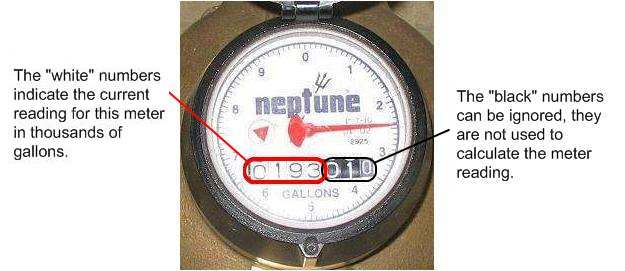Your water usage is measured in thousands of gallons over a monthly billing period. You can monitor the amount of water used in your home by taking readings from your water meter. The following illustration has been provided as a guide on how to read your water meter.
Water meters contain a row of scrolling numbers to indicate the current reading. When a water meter reading is taken at your residence only the “white” numbers are recorded, which rounds the measurement to thousands of gallons. The meter is read this way to save time and increase accuracy of readings. To determine your own meter reading note the “white” numbers as they appear on the face and disregard any “black” numbers.

In this illustration, the meter reads “193” THOUSAND GALLONS.
Keep in mind that when RMU meter readers take readings on your meter, they DO NOT set it back to zero. Therefore the numbers keep turning until the next time the meter is read. By subtracting two consecutive readings, the amount of water usage is determined for the month. When the readings are entered into a computer it immediately checks to see if the reading is about the same as the one the previous month. If it is quite a bit lower or higher, the meter reader is asked to re-read the meter to make sure the reading is correct. This helps to ensure your bill is accurate each and every month.
So, now what?
Once you know how to read your meter, it’s easy to figure out how much water you have used since your last water bill. Simply look at last month’s water bill to find the reading recorded by RMU meter readers. Then, subtract last month’s reading from the number you just took off your meter. What you end up with is the total number of thousands of gallons you have used since your last reading. You can also use the handy tool we have available on our website: Residential Bill Calculator
Remember, just reading the meter alone will not save money; however, it will help you become more aware of overall water consumption, and being aware is the first step to making wise decisions.
Where does all that water go?
Some big water consumers around your home may include irrigation systems, washing machines, dishwashers, showers and toilets. Water leaks, big or small, can also have a significant impact on your water usage.
There are things you can do to save water, and save money in the long run. To see some water conservation ideas click here.
